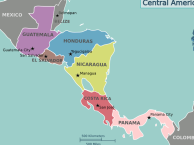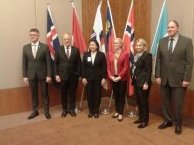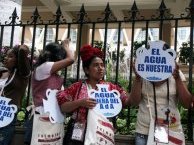
The European Union has been negotiating a free trade agreement with six Central American countries — Guatemala, El Salvador, Honduras, Nicaragua, Costa Rica and Panama — since mid-2007. The draft negotiating plan from the EU’s side is available here.
The background logic to this is clear. As soon as the US signed NAFTA, the EU followed suit and made its own bilateral trade agreement with Mexico. Now that the US has signed CAFTA, here comes an EU deal for the same countries (minus the Dominican Republic, which is part of the ACP grouping that the EU is already negotiating an EPA with under the Cotonou Agreement).
The deal is dubbed an “Association Agreement” in which the FTA is one component alongside others (concerning cooperation and political dialogue). It is also a “progressive” agreement in that its provisions are phased in over time.
But analysts concur that such association agreements are even worse than FTAs: “The agreements are notable for their broad scope and their ‘open’ and ‘ongoing’ nature; in other words, they oblige the signatory countries in years to come periodically to extend the agreement and to undertake an undefined number of judicial, administrative, economic and social reforms, the aim of which is to provide ever more favourable investment conditions for European companies. As they accumulate, the changes will amount to constitutional reforms, which will be decided at ministerial level, far from the eyes of Parliaments and public opinion in the countries concerned.”
The social movements of Latin America have made their position clear: “The Association Agreement is nothing more than a continuation of free trade agreements. These texts are a farcical denial of democracy from the word go. Like the DR-CAFTA, the FTAA, and NAFTA, they are all tools used by big capital to exacerbate and deepen the poverty and exploitation of those who produce wealth by their labour. DR-CAFTA has been in force for two years and already we see our countries being inundated with imports, afflicted by rising consumer prices, and starved of tariff revenues, leading to reduced public spending. On top of this, the US has blockaded Central American agricultural products on spurious phytosanitary grounds. Meanwhile, the inhuman deportation of our compatriots continues. The enforcement of the FTAs and the neoliberal model is bolstered by criminalization and repression of indigenous and peasant agendas — particularly, the struggle for Mother Earth — through the enactment of antiterrorism laws. Therefore, we say NO to the negotiation and signing of the Association Agreement between Central America and the European Union: it is contrary to the interests of our peoples.”
In May 2010, the text was agreed to, and in March 2011, the text was initialled. It still needs to be signed, ratified and put into force by all parties: the European Union, Costa Rica, El Salvador, Guatemala, Honduras, Nicaragua and Panama.
last update: May 2012
Photo: Cacahuate/Wikipedia/CC BY-SA 3.0




 :
:
